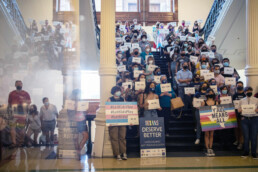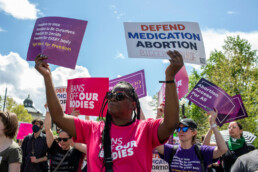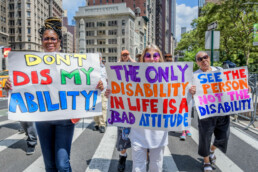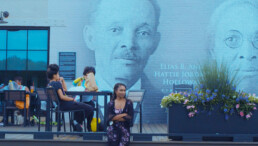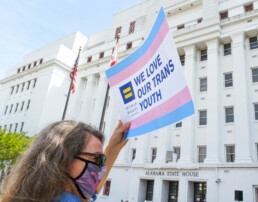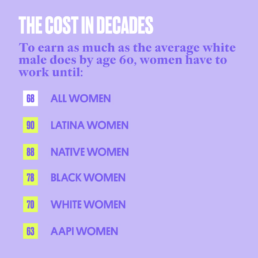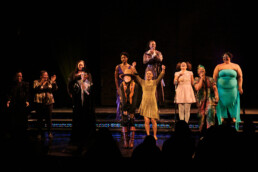How the Media Excludes Trans Voices
 March 28, 2024 Buona sera, Meteor readers, It is the official start of Easter weekend, with today being Holy Thursday for Christians and Thirsty Thursday for everyone else. Either way, wine is encouraged. No matter what the next few days bring you, we hope this weekend is a great one. In today’s newsletter, we take a look at how the media continues to fail trans people. Plus, a little bit of good news and our weekend reading list. Xoxo, Shannon Melero  WHAT'S GOING ONPanic! at the Times Disco: A new report from Media Matters and GLAAD has found that over the last year, The New York Times “excluded the perspectives of trans people”—referencing a failure to quote them—“from two-thirds of its stories about anti-trans legislation.” The study comes more than a year after Times leadership received two separate letters from staff members and LGBTQ advocates and organizations charging the paper with contributing to “a deadly anti-LGBTQ culture war.” According to the report, 66% of the articles covering the aggressive anti-LGBTQ legislation sweeping the nation did not quote a single trans or gender non-conforming person, but 18% of those same articles did cite misinformation from anti-trans activists “without adequate fact-checking or additional context.” Media Matters cited as an example this piece on North Dakota banning trans girls from girls’ sports teams, which didn’t ask any of the banned players how they’d been affected. The issue, of course, isn’t just about the Times’s journalism; it’s about the too-common framing of trans people as politically controversial entities rather than as members of communities everywhere. And those community members are under attack like never before: Last year, according to the ACLU, 510 anti-LGBTQ bills were introduced by legislators in nearly every state. (The only states which did not see bills introduced were New York, Delaware, and Illinois.) Of those bills, 84 were signed into law, doing everything from restricting bathroom use to eliminating gender-affirming care. Against that backdrop, reporting on anti-trans laws while omitting the people and families who know first-hand what they do is a dangerous act of dehumanization. You can read the full report here. AND:
 AID PACKAGES FALLING FROM THE SKY IN SOUTHERN GAZA. (IMAGE VIA GETTY)
 CLICK THE LINK ABOVE TO GET YOUR UNIQUE SHARE CODE TO SEND TO A FEW FRIENDS. IF FIVE OF THEM SIGN UP FOR THIS NEWSLETTER, YOU GET A METEOR TOTE!  WEEKEND READING 📚On the road: In an effort to woo environmentally conscious voters, both Republicans and Democrats are talking more about electric cars. But climate journalist Emily Atkin says we’re in for a wild ride of EV misinformation. (Heated) On education: Who the heck is Baby Olivia, and why is she in our classrooms? (The 19th) On “self-creation”: Photographer Rahim Fortune has beautifully executed the daunting task of capturing the lives, landscape, and character of the rural south. (The Atlantic)  FOLLOW THE METEOR Thank you for reading The Meteor! Got this from a friend? Subscribe using their share code or sign up for your own copy, sent Tuesdays and Thursdays.
|
![]()
What the SCOTUS Hearing Could Mean for Mifepristone
 March 26, 2024 Evening, Meteor readers, It was a brilliant weekend for basketball but not so brilliant for my bracket. Congratulations to this week’s top three participants in the Meteor’s March Madness bracket challenge: Marsha, Em, and my husband. In today’s newsletter, Samhita Mukhopadhyay speaks to Dr. Beverly Winikoff and Dr. Lisa Haddad of the Population Council, a research nonprofit with a special relationship to the Supreme Court’s mifepristone case—oral arguments for which were heard today. Plus we congratulate a history-making Englishwoman and check in on Diddy. Crossing my fingers for The Sweet 16, Shannon Melero  WHAT'S GOING ON
 TODAY AT SCOTUSThe Abortion Pill on TrialOne of its key researchers says Mifepristone was tested "with three times or more rigor" than other drugs.BY SAMHITA MUKHOPADHYAY ACTIVISTS OUTSIDE OF THE SUPREME COURT LAST SPRING IN SUPPORT OF THE ABORTION PILL. (VIA GETTY IMAGES) Today, the Supreme Court heard oral arguments in the first abortion case to come before the court since it overturned Roe v. Wade. The case, brought by the extremist group Alliance for Hippocratic Medicine (AHM), is challenging the U.S. Food and Drug Administration (FDA)—specifically the FDA’s 2016-2021 policies, which expanded access to the safe and effective abortion drug mifepristone, initially approved in 2000 and now the most common abortion method across the country. AHM’s main argument? That the FDA did not adequately study mifepristone’s safety risks. (We explain it more in-depth here.) The implications of this decision could be disastrous. As Fatima Goss Graves, President and CEO at the National Women’s Law Center, told us, “Banning mifepristone would upend abortion care not just in the conservative states that have been racing to ban it—but in all 50 states, no matter their laws.” But the case itself is farfetched, argues Dr. Lisa Haddad, the medical director for the Population Council’s Center for Biomedical Research, the nonprofit research center that led clinical testing on mifepristone more than two decades ago. In fact, she points out, over 5 million people have successfully used it since then. With the case now before the court, we spoke to Dr. Haddad and Dr. Beverly Winikoff, who worked at the Population Council for 25 years, where she was Program Director for Reproductive Health and Senior Medical Associate at the Council, which was the team that led clinical trials on mifepristone overseas. Now she serves as president of Gynuity Health Projects. Samhita Mukhopadhyay: You worked with the organization that facilitated the FDA approval of mifepristone—what are you feeling right now? Dr. Beverly Winikoff: I feel like I'm charging into the skirmish. I'm getting girded up. Can't these people ever go away? But it is very, very encouraging to see how everyday people understand that this is a highly political, not a scientific discussion. Dr. Lisa Haddad: I feel very frustrated and a little bit beaten up. And while I’m inspired by some of the voices speaking up in support of mifepristone, I see this trend in reducing access for women, and I'm scared that the science and the excellent evidence that supports this as a way to improve health outcomes will be overlooked and minimized. It's a slippery slope. BW: I think in the end, it'll be okay because of the politics—the FDA is there to do a job, and it has always done it quite well in protecting the public. And this is an attack on the FDA. When you look at it that way, there are many people who are on our side, including big pharma—because if this happens, they have no [incentive] to be able to put money into new drugs because somebody could come up and decide that they don't like that drug and they can [sue to] override the FDA, and that would be chaotic in the pharmaceutical world. It's not just abortion; it's every drug that gets approved. I think the politics of it is much bigger than abortion. That’s a good point. Can you walk us through what we need to know about the FDA approval of mifepristone? Was it the standard approval process or was it a long, hard-fought win? BW: It was cover-your-ass time the whole way along by the FDA. That was it. That was the theme. So, every single thing was done with three times or more rigor than any other drug I've ever heard of. But that's okay because the drug is very good and very safe. We also got the FDA staff to be very excited about it. People were really very interested in making sure it got through. When we did the final studies, we had several thousand people, and it performed very, very well. We were very attached to this product because it seemed safer and more effective than you could expect. So people were very excited about it because it had the potential to be a workaround for some of the political stuff of having to go to a clinic. You were doing it at home.  FOLLOW THE METEOR Thank you for reading The Meteor! Got this from a friend? Subscribe using their share code or sign up for your own copy, sent Tuesdays and Thursdays.
|
![]()
How can sterilization without consent be legal?
|
No images? Click here Yeehaw, Meteor readers, I assume we have all seen Beyoncé’s cover art for her next album, “Cowboy Carter,” which drops on March 29. As a country music lover myself, I can’t wait. In the meantime, may I entertain you with a song from Tanner Adell, another country artist whose music really spins my spurs? In today’s newsletter, we introduce you to disability rights activist and Ford Foundation officer Rebecca Cokley, who is shedding light on the forced sterilization of disabled people—a practice that’s still legal in many states. Plus, the death of a gaming icon, Joe Biden cancels more student loan debt (not mine 😞), and a weekend reading list. Your wannabe buckle bunny, Shannon Melero  WHAT'S GOING ON
 "AN UNEQUIVOCAL RIGHT TO BODILY AUTONOMY"Reproductive Justice for All of UsRebecca Cokley on how to stop the violence disabled people experienceBY SHANNON MELERO PARADE GOERS AT NEW YORK’S FIFTH ANNUAL DISABILITY PRIDE PARADE. (PHOTO BY ERIC MCGREGOR VIA GETTY IMAGES) “It is better for all the world if…society can prevent those who are manifestly unfit from continuing their kind.” That sentence, written by Justice Oliver Wendell Holmes in 1927, was the defining sentiment behind the seminal Supreme Court decision Buck v. Bell—a case which allowed states to continue the practice of forcibly sterilizing those it deemed unfit to reproduce, namely people of color, the physically disabled, and those considered to have mental “deficiencies.” In the specific situation behind Buck v. Bell, the plaintiff was Carrie Buck, a young white woman in Virginia who was forcibly sterilized for her “feeble-mindedness” under that state’s Eugenical Sterilization Act. It would be easy to dismiss that ruling and Holmes’ words as a relic from another time if the practice of forced sterilization hadn’t lingered so long after that case. Over the course of the twentieth century, roughly 70,000 Americans (mostly women of color) were forcibly sterilized—a practice activist Fannie Lou Hamer famously labeled the “Mississippi appendectomy.” And while the work of activists like Dr. Helen Rodriguez-Trias, founder of the Committee to End Sterilization Abuse, brought some change in the 1970s, forced sterilization is still a painful reality: As of 2022, there are 31 states where the practice can be authorized by a judge and/or performed on a disabled person without their consent. Rebecca Cokley—the preeminent activist and program officer of disability rights at the Ford Foundation—encountered this situation firsthand while giving birth to her daughter in 2013, and she shared the story onstage at Free Future 2023. As she was undergoing a C-section, Cokley recalled, her anesthesiologist said to her OBGYN, “While you’re down there, why don’t you go ahead and tie her tubes? Because kids like her don’t need to have kids.” Cokley’s OBGYN refused and, as Cokley put it, almost “jumped over the drape to beat him to a pulp.” But for many disabled people in America, that kind of support is non-existent. Instead, they’re left at the mercy of a medical system that, by design, excludes them. A 2023 study published in The Lancet found that “32% of health care professionals hold explicit preferences for non-disabled people over disabled people.” And as Cokley explains, the practice of forced sterilization is part of a larger pattern of disabled people—”especially women and girls”—being denied bodily autonomy: "You’re never told your body is yours and you have the right to say no,” she points out. “You’re never given ownership over your body.” Other advances have helped safeguard the rights of disabled people in certain areas—from the educational reforms of Thomas H. Gallaudet in 1817 to the passage of the Americans with Disabilities Act in 1990. Cokley and others want to ensure that reproductive justice, and the rights of all people with disabilities to have children how and when they want, is on the table, too. “We have an unequivocal right to bodily autonomy, and to make these choices,” she says. Cokley also notes, “Every policy recommendation moving forward on reproductive health, rights, justice, must include a disability lens. So when hearing about people having to travel across multiple states to access [abortion] care, I want the public to think. ‘So what would that mean if you're disabled and say, don't have access to accessible transportation, or need other assistance?’" You can watch Cokley onstage at Free Future 2023, in conversation with Catalina Devandas, the UN’s first Special Rapporteur on the Rights of Persons with Disabilities and human rights advocate Maryangel Garcia-Ramos, here. (Their session begins at 2:25:25.) This series is a collaboration between the Gender, Ethic, and Racial Justice - International program at the Ford Foundation and The Meteor.  WEEKEND READING 📚On the ground: Over a thousand Gazan children have survived unfathomable violence and been medically evacuated to surrounding countries where they live as refugees and amputees. One reporter asks: What will the rest of their lives look like? (The New Yorker) On rising stars: USC’s Juju Watkins is ready to steal the spotlight during this year’s NCAA Tournament. As the kids say, she’s got the rizz. (The Washington Post) On family trees: The unexpected way some people are discovering the prevalence of incest. (The Atlantic)  FOLLOW THE METEOR Thank you for reading The Meteor! Got this from a friend? Subscribe using their unique share code or snag your own copy, sent Tuesdays and Thursdays.
|
![]()
Facing 10 Years of Prison for Smoking Weed
 March 19, 2024 Greetings, Meteor readers, It’s last call for any of you wanting to participate in our March Madness challenge! Just click the button below to join our group and share your women’s bracket. And don’t forget, the best way to support women’s sports is to watch: Most games will be available on ESPN2 or ESPNU, but UConn v. Jackson State and Iowa v. Holy Cross—featuring Paige Bueckers and Caitlin Clark, of course—will be on ABC. In today’s newsletter, I promise not to speak further of basketball. Instead, Samhita Mukhopadhyay walks us through Oprah’s weight loss special. Plus, a new book for your TBR pile and a princess sighting. Ball is life, Shannon Melero  WHAT'S GOING ONOprah is done with the fat shaming…again: ICYMI, Oprah has another special out about weight shame and drugs like Ozempic. Released yesterday on the heels of her decision to step down from the Weight Watchers board and share with the public that she herself is on a semaglutide (the much talked about class of drugs like Ozempic and Mounjaro), the show was an effort at busting common myths around obesity. As someone who’s written about the topic, I thought I’d break down the good and less-good coverage: The good: She emphasized one of the most groundbreaking shifts in thinking that has come thanks to the popularity of these new “obesity meds”—the understanding that weight gain is not solely connected to your willpower. People often discriminate against and hate fat bodies because they believe fat people lack the personal control not to be fat, and, for this reason, deserve the shame and admonishment we as a society dole out to them. In developing drugs that address physiological components, science is confirming what fat activists have long said: Some of our bodies are just different, and the only path forward is to accept that. But here’s where the special missed the mark: Rather than rethink what our hatred of fat bodies means for society and medical institutions—something that would be groundbreaking for Oprah to do—she purports that one of the only ways to eradicate this stigma is to become unfat, most notably through the help of this new class of drugs. (The special features several weight loss “success” stories of people whose lives changed dramatically by taking a semaglutide). But why is being fat something that needs to be solved? It’s great that Oprah is undoing the shame we feel around our decision to take these drugs—but perhaps it’s also okay to just be fat. (FWIW, I believe Oprah knows this truth; it’s just not an easy one to get across in primetime.) The only people who should really feel shame are those who continue to perpetuate the idea that the only way to live a healthy, happy life is to be thin. For more on how Oprah has contributed to how we talk and think about weight loss, check out this episode of In Retrospect about her lifelong, public battle with her weight and what it’s meant for the culture. At the top of her special, Oprah admits she gave in to the pressure to apologize for her weight and refuses to do so anymore. I’m happy for her. But what would it look like to embrace such an attitude without also recentering thinness? AND:
 ONE WOMAN'S FIGHT“This Isn't Speedy or Fair”Lauren Smith’s waited over four years for her day in court.BY NEDA TOLOUI-SEMNANI  LAUREN SMITH HAS BEEN SEPARATED FROM HER YOUNGEST CHILD FOR FIVE YEARS. (IMAGE VIA THE METEOR) Four months ago, I wrote in this space about Lauren Smith, a 32-year-old mother who lost custody of her youngest child in 2019 after she and her infant tested positive for THC, a cannabinoid substance, at delivery. Smith was arrested six months later and charged with felony child neglect for using marijuana while pregnant—a charge which, in Greenville, South Carolina, carries a sentence of up to 10 years in prison. When we published the article, Smith’s trial date was set for the week of February 19, 2024, which was, rather poetically, five years nearly to the day after she had delivered and lost custody of her youngest daughter. The child has been living with her paternal grandmother since she was three days old. But weeks before the trial was set to start, Smith learned her court date would be pushed for a third time. It is now scheduled for the week of April 22. “Isn't everybody due a speedy, fair trial?” Smith told me earlier this month. “This isn't speedy or fair.” The latest holdup comes after the Greenville County solicitor's office entered more than 125 pages of new documentation into discovery. This is called a “document dump,” a legal maneuver in which one side enters hundreds, sometimes thousands, of pages of new documentation within weeks of trial in an effort to overwhelm the opposing side. (This is the second time the prosecution has used this delay tactic. The first was last May when they entered several hundred additional pages of documentation as discovery.) Despite the U.S. Constitution guaranteeing the right to a fast trial, Stuart Sarratt, a former Greenville County public defender familiar with the Smith case, says, “South Carolina essentially does not have any kind of right to speedy trial.”  PHOTO BY NILO TABRIZI Neda Toloui-Semnani is an Emmy-winning journalist and the author of They Said They Wanted Revolution: A Memoir of My Parents.  FOLLOW THE METEOR Thank you for reading The Meteor! Got this from a friend? Sign up for your own copy, sent Tuesdays and Thursdays.
|
![]()
Young People Are Two Times More Likely to Identify as LGBTQ+
 March 14, 2024 Evening Meteor readers, My child has been making little paintings of animals for the last few days, and I’ve decided to retire as a writer and live off of what is sure to be her prolific career as an artist. So I guess this is goodbye. I’ll remember to invite all of you to her opening night at The Met.  "THE LAST PENGUIN" BY THE ARTIST KNOWN ONLY AS V In today’s newsletter, we congratulate all the people who told Gallup they were queer. Plus, how Olivia Rodrigo is setting the standard for politically minded artists, and our weekend reading list. Shannon Melero  WHAT'S GOING ONWe’re here, we’re queer: Yesterday, Gallup released the findings of a major 12,000-person 2023 survey on sexual orientation and gender identity, revealing a sharp increase in young adults identifying as queer over the last few years. “LGBTQ+ identification in the U.S. continues to grow, with 7.6% of U.S. adults now identifying as…some other sexual orientation besides heterosexual.” This is a notable uptick from just four years ago, when just 5.6% of adults identified as LGBTQ+. So: Who’s most likely to say they’re LGBTQ+? First of all, young people. According to the data, Gen Z and millennials are twice as likely to identify as LGBTQ+ than older generations.  And the rise is also being driven by women. Among Gen Z respondents—the group who most self-identified as LGBTQ+—women were almost three times as likely as men to do so (28.5% of them did, vs 10.6% of men). The report also includes an important note: “The gender differences reported…do not account for the nonbinary population.” We’ll have to wait for further surveys to understand how the roughly 1% of Americans who consider themselves nonbinary identify. This is exactly the kind of data that rankles conservative lawmakers, and they’re likely to use it as a prime example of the degradation of core American values (life, liberty, and the pursuit of heteronormativity). But given the documented consequences of being unable to live life on your own terms—from depression and loneliness to suicide—the fact that so many young (and youngish) people are identifying as LGBTQ+ suggests tremendous progress in how comfortable they feel. Previous research suggests Gen Z is better equipped with “a language of gender” and peer support than previous generations were. So while extremists might see these numbers as proof of the “gay agenda,” they can also be seen as proof of societal progress—which couldn’t come at a more urgent time, considering the dark cloud of violence towards LGBTQ+ teenagers stoked by fearmongering adults like Moms for Liberty, Libs of Tiktok, and more. And the death of Nex Benedict, a transgender teenager in Oklahoma who died in February after a physical altercation at his school, shows just how fatal that violence can be. (An early autopsy report has ruled Benedict’s death a suicide, an outcome that is all too common among transgender youth—no doubt connected to the rise of anti-LGBTQ legislation, schools that don’t punish bullies, and more) Against that backdrop, a question for all of us: Now that we know so many young people are queer, what are we doing to protect them? If you or someone you know is struggling with suicidal thoughts you can reach a counselor via The Trevor Project by clicking here or texting 678-678. AND:
 FRIENDLY REMINDER!As I mentioned on Tuesday some of us at The Meteor will be cobbling together our limited knowledge of the inner workings of women’s college basketball and making official NCAA brackets. But wouldn’t it be more fun to do it with our readers? Selection Sunday is THIS weekend so put your women's bracket together and send a PDF of it to [email protected]. As the tournament progresses, I’ll track everyone’s picks until there’s only one bracketologist left standing. That lucky duck (get it? DUCK! Yes, I am placing Oregon high on my bracket don't judge me.) will get a fabulous Meteor tote and bragging rights. The cut-off for sending in your brackets is the evening of March 20, we're closing up the party after that. May the three-pointers be ever in your favor.  ME TO MY COWORKERS IF I WIN THIS THING  WEEKEND READING 📚On not calling the cops: In 2020, a young girl in New Orleans reported that she had been raped by a friend and then pressured to complete a rape kit. But shortly after that horrific day she was sexually assaulted again and this time her assailant was the police officer who escorted her to the hospital for that first rape kit. (The Washington Post) On the lookout: The internet wildfire surrounding Catherine, Princess of Wales, has shed light on a larger issue of how the general public can feel such strong ownership over one woman’s body. (The Atlantic) On knowing thyself: “The moral case for letting trans kids change their bodies.” (Intelligencer)  FOLLOW THE METEOR Thank you for reading The Meteor! Got this from a friend? Subscribe using their share code or sign up for your own copy, sent Tuesdays and Thursdays.
|
![]()
Your Body, Your Gender Pay Gap
 March 12, 2024 Greetings, Meteor readers, This weekend, while all the cool kids were watching the Oscars, I was baking bread. Not to brag (she says before bragging), but it is the best loaf I’ve made since I started learning how to bake bread a week ago. Maybe those “tradwives” were on to something? Just kidding! Katie Britt is still our collective sleep paralysis demon.  In today’s newsletter, we connect a few dots between the gender pay gap and abortion access. Plus, an update on Florida’s “Don’t Say Gay” law and, of course, that “missing” princess. Live from my kitchen, Shannon Melero P.S. This Sunday is Selection Sunday for the Women’s March Madness tournament, and if you’re making a bracket this year, there’s a fun challenge for you at the end of this newsletter.  WHAT'S GOING ONThere are no coincidences: Today is Equal Pay Day, the date that marks how far into the next year a woman will have to work to make as much money as a man in a similar position made the previous year. On average, for every dollar a non-Hispanic white man makes, a woman will earn 84 cents. Other factors that lower this number include race, parental status, full-time versus part-time employment, and geography. And when you go state by state, a pattern emerges. Take, for example, the five states with the largest pay gaps: Utah (73 cents), Louisiana, Alabama, New Hampshire (all at 75 cents), and Idaho (76 cents). What else do all of these states have in common? If you guessed abortion restrictions, then you are correct. Louisiana, Alabama, and Idaho have total bans, while Utah imposes extreme restrictions, and New Hampshire criminalizes abortion after the 24th week of pregnancy. Coincidence? I think not. But there are a few ways that the rollback of bodily autonomy plays into the larger economic status of women across the country. It’s partly simple cause and effect. The ability to have children when and how you want feeds financial independence: In the 1970s, when birth control became more accessible, women were able to slowly ascend the ranks of the workforce and get into higher-paying jobs; our paid labor now accounts for a quarter of America’s GDP. Of course, many other factors contribute to the wage gap, too—including the amount of time women spend on unpaid labor, institutional racism, the lack of social safety nets for parents, and the conservative backlash to women entering the workforce. But those factors are often worsened by the same conservative state legislatures passing abortion bans: In other words, the people passing the bans are often the same people refusing to lift the minimum wage for working families who do have babies. Still with us? And when governments are unable to see reproductive rights as a factor in economic stability, they’re willfully ignoring the financial hurdles that millions of women face and facilitating a return to the 1950s ideal of housewives and heteronormative families. Anne Boleyn once said of her stepdaughter, “She is my death and I am hers.” And that’s how it is with reproductive justice and economic progress—the death of one is the death of the other. As policy analyst and researcher Asha Banerjee wrote in a report for the Economic Policy Institute, “The states banning abortion rights have, over decades, intentionally constructed an economic policy architecture defined by weak labor standards, underfunded and purposefully dysfunctional public services, and high levels of incarceration…we find that, generally, the states enacting abortion bans are the same ones that are economically disempowering workers through other channels.” AND:
 CLICK THE LINK ABOVE TO GET YOUR UNIQUE SHARE CODE TO SEND TO A FEW FRIENDS. IF FIVE OF THEM SIGN UP FOR THIS NEWSLETTER, YOU GET A METEOR TOTE! ALREADY HAVE A CODE BUT CAN'T FIND IT? NO WORRIES, IT'S WAITING FOR YOU DOWN BELOW ⬇️
 FRIENDLY COMPETITION 🏀So about that fun challenge I mentioned up top! Like countless others this weekend, I will be cobbling together my limited knowledge of the inner workings of women’s college basketball and making an official NCAA bracket. But wouldn’t it be more fun to do it together? It would! Here’s how we’ll be doing our Meteor community March Madness. Put your bracket together, and send a PDF of it to [email protected]. As the tournament progresses, I’ll track everyone’s progress until there’s only one bracketologist left standing. That lucky duck will get a fabulous Meteor tote and bragging rights. The tournament begins March 20, so you’ve got until midnight that evening to send me your brackets. May the three-pointers be ever in your favor.  FOLLOW THE METEOR Thank you for reading The Meteor! Got this from a friend? Subscribe using their share code or sign up for your own copy, sent Tuesdays and Thursdays.
|
![]()
What Would Octavia Butler Say?
 March 7, 2024 Evening, Meteor readers, This weekend is a busy one: we’ve got the Oscars, Daylight Savings, and the start of Ramadan. So remember to set your DVRs, turn your clocks, and buy your dates (the fruit, that is). In today’s newsletter, we’re excited to share that our recent show In Love and Struggle Vol. III is now available for your listening pleasure on Audible. Below, Rebecca Carroll explains the genesis of the groundbreaking series and talks to some of this year’s cast. Plus a look at how far we haven’t come when it comes to on-screen representation. Loving and struggling, Shannon Melero  WHAT'S GOING ONThe white carpet: As Hollywood gears up to pat itself on the back for another successful year of movie-making, the perennial question comes to mind: #Oscarssowhite or nah? Well, according to a study from USC Annenberg’s Inclusion Initiative, the answer—not just about the Oscars but about filmmaking in the last few years—is still a resounding yah. The study is far-reaching, looking at 1700 of the top-grossing films between 2007-2023. But the findings for 2023 are of particular concern, because they show that despite all the promises studios have been doling out about diverse storytelling, the trends prove otherwise. Of the 100 top-grossing films last year, only 37 featured a lead or co-lead of color with only 14 of them being women of color. (Those films, in case you want to watch them, are: The Little Mermaid, Transformers: Rise of the Beasts, Elemental, Scream VI 1, Wish, The Color Purple, Talk to Me, Missing, Magic Mike's Last Dance 2, Ruby Gillman Teenage Kraken, Joy Ride, Bottoms, Suzume, and Past Lives.) The study also found a direct correlation between the race and gender of a film lead to that of the film’s director. Of the 37 films that featured a lead or co-lead of color, 19 of them were directed by a person of color. Meanwhile, for the remaining 63 top-grossing films of 2023 that featured white leads, 57 of them were helmed by white directors. “Undoubtedly, when the number of top films starring girls and women drops, so too do opportunities for women directors...As with gender, the [racial] identity of the lead is connected to the identity of the director.” Yikes. While on-screen representation may feel like a trivial issue, the stories we watch help shape what we believe is possible for ourselves and our communities. If the stories we see onscreen continue to center white narratives and Euro-centric storytelling, it only reinforces that our stories aren’t important. Moreover, if the success of projects like Black Panther, Moonlight, Roma, and Encanto are any indication, this continued lack of representation isn’t just harmful to the broader culture—it’s also just bad business. And the study’s authors make a final point about what this low representation says about Hollywood: “The numbers this year will likely be particularly shocking to those who anticipated a banner year for women, given the success of Barbie,” they write. What a well-worded reminder that one pink tide will not lift all boats.
AND:
 ON STAGE WITH THE METEOR“A Perfect Example of Active Sistering”The voices behind this year's In Love and Struggle are ready to be heard.BY REBECCA CARROLL  OUR BRILLIANT CAST (PHOTO BY JP YIM VIA GETTY IMAGES Nearly 25 years ago, I met Alice Walker at a bookstore in San Francisco. She inscribed her book to me, “For Rebecca, In love and struggle, Alice Walker.” The phrase, which I later discovered had its roots in the work of Chinese American activist Grace Lee Boggs, struck a particular chord in me. Many years after, and with Walker’s blessing—a live event and audio series were born. The In Love and Struggle series celebrates and amplifies the experiences of Black women and nonbinary folks through a mosaic of monologues, music, and comedy. The Meteor launched the first iteration of the series in 2020 at the Minetta Lane Theater in Manhattan, just days before the pandemic hit, featuring performances by Anita Hill, Sasheer Zamata, and Brittany Packnett Cunningham. It was a bright and beautiful blessing to carry with us into such an uncertain time. We’ve been producing In Love and Struggle ever since, and last December, In Love and Struggle V3: The Future is Around Us was presented live again at the Minetta Lane Theatre. As the subtitle hints, it’s a powerful tribute to the ways in which Black women actively imagine the worlds we want. Inspired by the work of Octavia Butler and other Afrofuturists, the performers were asked to create their own original short piece about a futurist or alternate world of their own making. With In Love and Struggle V3 out today on Audible, I asked the performers to reflect on their experience participating in the show. In this installment, the performers include: Cree Summer, Zainab Johnson, adrienne maree brown, Maria Bauman, Amanda Seales, Nona Hendryx, Sami Schalk, Sol, and Mahogany L. Browne.  MADAME PRESIDENT ZAINAB JOHNSON, MASHALLAH. (PHOTO BY JP YIM VIA GETTY IMAGES) Comedian Zainab Johnson, whose “Black Muslim woman president” had the crowd gagging, said, “It is a gift to be able to be a part of something with an essence that both surprises you and captivates you.” Writer and activist adrienne maree brown, who sang a beautiful meditation on the symbolism of walls in Octavia Butler’s work, shared that “the prompt allowed me to tune in to what Octavia was offering now, and how I could let that flow through me.” Mahogany L. Browne performed a poem called The Future of We and said of performing it alongside the other creators, “In Love and Struggle is a perfect example of active sistering. The women who create cause ripples that course-correct our internal compass—the monologues, dance, vibrations, psalms, and sound always lead us safely home.”  MAHOGANY L. BROWNE PERFORMING THE FUTURE OF WE. (PHOTO BY JP YIM VIA GETTY IMAGES) And Dr. Sami Schalk, fresh off twerking onstage with Janelle Monáe, told the story of her experience swimming in the Luminous Lagoon in Jamaica. On telling it to an audience, she said, “Despite my nerves, the experience was transformative, a true manifestation of the imaginary world we collectively created with our writing.” You can listen to the show in its entirety, here.  WEEKEND READS 📚On THAT conversation: Only read this if you’ve seen the wedding episode of Love Is Blind and need some perspective on the thing that happened with you know who and his you know whats. (Andscape) On your TBR list: You can never have too many books and these titles penned by women athletes turned authors will keep you glued to your reading corner. (Togethxr) On deepfakes: Representative Alexandria Ocasio-Cortez is on a mission to end deepfake porn. (Rolling Stone)   FOLLOW THE METEOR Thank you for reading The Meteor! Got this from a friend? Subscribe using their share code or sign up for your own copy, sent Tuesdays and Thursdays.
|
![]()
The "Zombie Law" That Could Ban Abortion Pills
 March 5, 2024 Greetings, Meteor readers, Many of you know that I am a football girlie. And while I am not now, nor have I ever been, an Eagles fan (the only bird I recognize is the mighty Seahawk), I did ugly-cry at Jason Kelce’s retirement speech. You don’t need to watch the whole thing, but this portion about Kelce and his brother achieving their dreams together made me want to call my sister (who is also a writer) and openly weep. But that would be weird! Anywho, today is Super Tuesday, and if your state has a primary, you know what to do. Most polling locations are open until 9 PM, but you can always confirm that over at vote.org. In today’s newsletter, we learn about the Comstock Act, congratulate the French, and despair over a new gender equality report from the World Bank. Cry Eagles Cry, Shannon Melero  WHAT'S GOING ONMoving backwards: In December, journalist Susan Rinkunas warned us about “zombie law” revival becoming the go-to move for Republicans looking to restrict abortion access in states where it’s still nominally legal. Now, that prediction is coming true in some of the worst ways. Writing for Jezebel, Rinkunas lays out what voters need to know when it comes to the potential return of the Comstock Act of 1873—and how 145 Republicans in Congress are asking the Supreme Court (via an amicus brief) to use Comstock as legal precedent to ban the mailing of mifepristone nationwide. What is the Comstock Act? In short, it’s an incredibly conservative “chastity law” that made the dissemination of contraceptives, birth control, or any materials related to abortion a federal offense. (In the mid-1900s, some states doubled down on Comstock and enacted local laws that criminalized the use of birth control for married couples as well as single women.) The strength of the outdated law was whittled away over time, though not completely: “In 1971, lawmakers repealed the portions related to birth control and, in 1996, a bipartisan group of House members tried and failed to repeal the provision about mailing abortion materials,” Rinkunas writes. But once again, Comstock is rearing its ugly head. In both the SCOTUS brief and elsewhere, Republicans have touted the bill as a way to restrict the mailing of abortion pills nationwide. Senator Elizabeth Warren is having none of this. Speaking to Jezebel via a spokesperson, Warren posits that, as currently written, Comstock “does not prevent the mailing of medication abortion.” But something as trivial as accurate legal interpretation may not be enough to stop the court (which hears its mifepristone case on March 26) or a future Republican Congress enabled by a Republican president. We’ve already heard endless horror stories about what restricting access to abortion is doing to pregnant people around the country. And as of now, more than half of all abortions in the U.S. are performed using mifepristone. Should this (demonstrably safe) method be made inaccessible, by Comstock or any other means, those horror stories will only pile up. So what can be done? Congress can…you know, do its job and repeal Comstock altogether. Even if the repeal doesn’t go through, bringing it to a vote will force Republicans to make clear where they stand (and get voted out if they’re standing in the wrong spot). AND:
 FRENCH PROTESTORS OUTSIDE THE SORBONNE AHEAD OF THE VOTE TO ENSHRINE ABORTION RIGHTS. (VIA GETTY IMAGES)
 WHAT YOU TOLD US ABOUT PROJECT 2025—AND THE ELECTIONLast month, we wrote about Project 2025—the massive conservative Republican plan detailing what that party aims to do should they win the presidency this fall. (There’s a lot in it, from banning abortion nationwide to eliminating the Department of Education.) And when the story went up on our Instagram, it quickly became one of our most-commented posts of the season, with healthy (and generally respectful; we love you for that) debates around what these proposals mean and how they’ll influence your vote. Some of the disagreements were about how real the risk of Project 2025 is: “Please stop with the fearmongering,” wrote one commenter; “don’t give that group credit,” posted another. But as we mentioned in our original coverage, The Heritage Foundation are Washington insiders. As Emerge America head Ashanti Gholar (@ashantigholar) commented: “ They are not a tiny fringe group, they are the largest conservative think tank. They are responsible for…many of the horrible policies we see across the country starting with Reagan’s in the 80s.” But the most vigorous debates were the ones in response to the headline of our story: “Life under the next Republican president won’t be pretty.” As Alana Hadid (@lanzybear) posted, “Life under the current president isn’t either…It takes a huge amount of privilege as an American to worry more about what happens to us than how the rest of the world suffers under us. If Democrats don’t win that's because of what they have done to the rest of the world.” Another commenter put it this way: “I could never vote for Biden after his administration’s current immigration policy, their…[refusal] to stand against fossil fuel expansion….their outright material support for genocide.” Others stated their plan to undervote, or to put energy into fighting for a multi-party system. Many of you disagreed, responding that “there is one party on record that is trying to help all, and there is another party that isn’t,” and charging that “half of these comments clearly don’t know the difference between what is controlled by Congress versus the POTUS….Or gerrymandering. Or how things were stacked in the courts from the last administration.” Kelly Will (@misswillful) noted, “These comments about giving up are tragic! COME ON! We finally all agree [things] need to change. Let’s vote for a decade straight like our lives depend on it, because they do.” So—why are we resurfacing all this? Because your comments capture a conversation that’s happening all over the country. (And at The Meteor, too: Shannon has been yelling about Project 2025 like Paul Revere on a December night.) And with eight months till an election that Donald Trump could genuinely win, dismissing one another’s concerns isn’t the answer; hearing each other out is. So let’s keep doing it. We want to know: How are you feeling about the upcoming election? Which issues are heaviest on your mind right now? Does Project 2025 scare you into action, and if not, why not? And what kind of reporting and coverage would you like to see from us at The Meteor? Our ears and inboxes are open, and your feedback will help us shape our work for the next eight months and beyond. You can write directly to us at hello@wearethemeteor.com or, if email isn’t your thing, DM us on Instagram. —The Meteor Team  FOLLOW THE METEOR Thank you for reading The Meteor! Got this from a friend? Subscribe using their share code or sign up for your own copy, sent Tuesdays and Thursdays.
|
![]()
What We Get Wrong About Adoption
|
Evening, Meteor readers, It’s Leap Day! Which means I spent most of the morning googling, “What is the point of a leap year?” (Something to do with keeping the solstices in proper order. We love to be orderly!) In today’s newsletter, The Meteor’s Rebecca Carroll talks to Dr. Gretchen Sisson about her new book on adoption. Plus, we look at a huge blow against IVF protections and some weekend long reads. Leaping, Shannon Melero  WHAT'S GOING ON
NATALIE MEBANE, CHIEF PROGRAM OFFICER OF THIS IS ZERO HOUR. (PHOTO BY MARIAH MIRANDA)
 WRITERS ON WRITERSGretchen Sisson on Inequality in the Adoption System“It is so often framed as a 'reproductive choice,' but I think it’s better understood as an expression of resourcelessness and constraint.”BY REBECCA CARROLL America loves an adoption story. It’s got all the feel-good elements we love to romanticize: A baby is born to parents unable to care for it, a hopeful family is given the gift of an unwanted child, and everyone lives happily ever after. But the truth, many experts say, is that the institution of private adoption in America is mired in dysfunction, exploitative practices, and systemic inequities—and in far too many cases, almost no one lives happily ever after. This dysfunction is what interests Dr. Gretchen Sisson, a qualitative sociologist at the University of California, San Francisco, and author of a new book called Relinquished: The Politics of Adoption and the Privilege of American Motherhood. Through over a hundred interviews with American mothers who placed their children for adoption between 2000 and 2020, Sisson’s book aims to debunk myths around an institution I’ve thought a lot about myself: As a transracial adoptee whose memoir, Surviving the White Gaze, is cited in Sisson’s book, I was eager to sit down to talk with her about the politics of adoption. And so, an adult Black woman transracial adoptee meets a white woman sociologist on Zoom. Here’s what happened. Rebecca Carroll: You chose to interrogate the institution of adoption through the experiences of birthmothers—why? Gretchen Sisson: The question that brought me to the work in the first place was understanding how women end up choosing adoption. “Choosing” is a loaded term, but how they end up on the path to relinquishing their children, and what the circumstances are around that. And what were your main findings? I think the two most important takeaways are, first, that adoption does not offer any meaningful alternative to abortion access. Not only are people who need abortions generally uninterested in adoption, but people who relinquished for adoption usually wanted to parent their children. Adoption is so often framed as a “reproductive choice,” but I think it’s better understood as an expression of resourcelessness and constraint. Rather than an “empowered option,” it is often a reflection of a lack of power. And, second: that adoption generally does not serve relinquishing mothers well. The grief, trauma, and disconnection of adoption belie the idea that it is unambiguously “beautiful”—and nearly all mothers came to a place of critique and cynicism that acknowledged this, with many carrying complex feelings around regret and loss. You write in the book about how, in popular culture, birthmothers are generally portrayed as either happily moving on or becoming pathologically dangerous. Were there depictions that birthmothers you spoke with felt accurately reflected their experience? Many of the mothers were drawn to The Handmaid's Tale. The entire history of Handmaid's Tale is very complicated, and I don't want to gloss over that, but that [book] resonated most for them. That one, this extractive child-taking was acknowledged as a loss within the context of the show. And two, that the forces that were separating [birthmothers from their children] were driven by these regressive, religious, racialized, patriarchal ideas.  WEEKEND READS 📚On the pitch: There’s a new professional women’s soccer league in town, but is a second major league sustainable? (Front Office Sports) On de-girlboss-ification: Sophia Amoruso is bidding farewell to the Frankenstein’s monster she accidentally created: #girlboss. “It’s not that I’m embarrassed by it, but I don’t want to be defined by it.” (Elle) On integrity: In December, The New York Times published an investigation into sexual assault by Hamas on October 7. But now, some of that reporting is coming under fire as misrepresenting the facts to “bolster a predetermined narrative.” (The Intercept)  FOLLOW THE METEOR Thank you for reading The Meteor! Got this from a friend? Subscribe using their referral code and you could both earn a prize. Or sign up for your own copy, sent Tuesdays and Thursdays.
|
![]()
Pregnant Women Can't Get Divorced in Missouri
 February 27, 2024 Salutations, Meteor readers, Last week, I shared with all of you that I was doing my first-ever Polar Bear Plunge. Thanks for asking—it turns out plunging is amazing and oddly life-affirming. Who knew? In today’s newsletter, we’ve got an archaic divorce law, some insight into Libs of TikTok, and one billion reasons to attend medical school in the Bronx. Signing up for swim classes, Shannon Melero P.S. Today is the birthday of my friend Anthony. Many of you read Anthony’s story in this newsletter and responded with kind words. Please join me in spirit tonight and raise a glass to lost loved ones and the joy of their memory.  WHAT'S GOING ONOutdated laws: Divorce law is fascinating in how it varies from state to state. You’ve got states with common property laws, states with no-fault divorce language…and then you’ve got Missouri, Texas, Arizona, and Arkansas—states where judges cannot finalize divorce papers if one of the parties is pregnant. (It is, indeed, 2024.) Ostensibly, these kinds of laws were put in place to help ensure the future welfare of the child: The divorce cannot be signed, sealed, and delivered until the child is born, and custody arrangements, as well as child support, can be bundled into the divorce terms. However! The law overlooks what can—and, experts say, does—happen in abusive relationships: “For abusive partners, they might be using reproductive coercion and control to keep their partner pregnant so that they can’t ever actually be granted a divorce,” a spokesperson with the Missouri Coalition Against Domestic & Sexual Violence told The Hill. Missouri state representative Ashley Aune, who is working to change the language of this law, has seen its damage firsthand. One constituent told Aune that she was being abused by her husband and had been coerced into getting pregnant. She sought a divorce, unaware of the law, and was told it couldn’t be finalized before giving birth. “She felt she had no options,” Aune said. (And she didn’t: Missouri is also an abortion-ban state, so people who might wish not to bear a child with an abusive partner can’t make that decision.) “I think it’s important that women who…are also looking to get out of a marriage have the capacity to do so,” Rep. Aune told the Kansas City Star. AND:

  FOLLOW THE METEOR Thank you for reading The Meteor! Got this from a friend? Subscribe using their share code or sign up for your own copy, sent Tuesdays and Thursdays.
|
![]()
